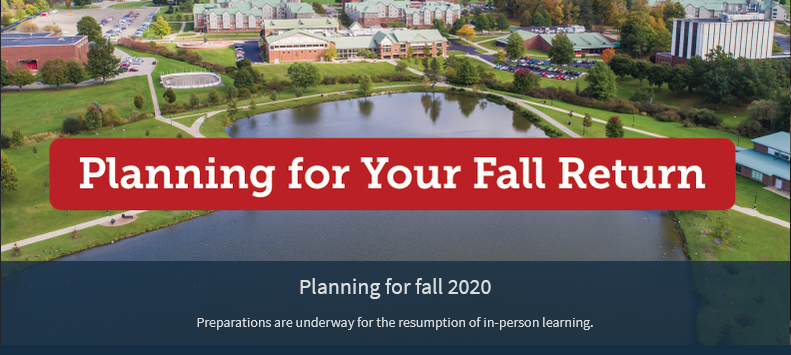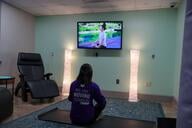You have /5 articles left.
Sign up for a free account or log in.

iStock
Edinboro University of Pennsylvania, Lafayette College, the University of Delaware and St. John's College of Nursing on Wednesday announced that they would offer all or most of their classes virtually this fall.
"We have had to pivot and adapt many times over the last several months, and I know that it has not been easy. We now need to do so again," Lafayette's president, Alison R. Byerly, said in the college's announcement. (The college also said it would reduce tuition by 10 percent for those who study from home.)
The fluidity of the situation may be reflected by the fact that Edinboro's homepage, which included a link to its announcement about being virtual, states that "preparations are underway for the resumption of in-person learning" (see photo at right).
Two California private institutions, Azusa Pacific and Pepperdine Universities, also announced Wednesday that they would conduct their fall semesters online, citing recent guidance for K-12 schools from the state's governor, Gavin Newsom. While Newsom has yet to issue guidance specifically for colleges and universities, said James Gash, Pepperdine's president, those recommendations are likely to mirror those for K-12, leaving "little confidence that campuses will be allowed to reopen for the start of the fall term with in-person instruction in a way that reflects Pepperdine’s standards of excellence."
The University of California, Merced, meanwhile, joined the university's Berkeley campus Tuesday in saying that it would start the semester online in late August but hoped to reassess after four weeks if health conditions permit.
Clemson University said that it, too, would begin the fall term online Aug. 19 but planned to bring students back to campus a month later, on Sept. 21.
"We believe that by delaying the resumption of on-campus activities for another four weeks, and by strictly following the recommended health precautions, the disease will be reduced to a point where we can safely return to something approximating a normal learning environment," Clemson president James P. Clements said in a blog post.
While the latest announcements vary in how definitively institutions are committing to fully or mostly virtual instruction this fall, they reflect an increasingly evident shift by colleges and universities in conceding that previously announced plans to resume in-person learning are no longer feasible.
That's more than a gut sense. A database released this week by Davidson College's College Crisis Initiative shows that of the roughly 2,000 two-year and four-year colleges that have definitively announced plans for the fall so far (the project lists 800 as "to be determined"), slightly more will be fully (119) or primarily (693) online than primarily (627) or fully (72) in person, with most of the rest (480) planning for mostly hybrid classes.
The project, funded by the ECMC Foundation and led by Chris Marsicano, a visiting assistant professor of educational studies at Davidson, represents the work of a team of student data collectors and "data wizards" who built the visualizations.
Visit the initiative's website for a clickable version of the dashboard below.
The other steady drumbeat of decisions about the fall surrounds athletics -- at least outside the top levels of the competitive landscape.
At least two more Division III conferences, the Liberty League and the North Coast Athletic Conference, announced Wednesday that they would not play sports through the end of 2020.
And pressure is building even on sports powers to do the same. Governor Michelle Lujan Grisham of New Mexico this week urged the two universities in her state to postpone all sports, including football, this fall, ESPN reported.
"Sports, especially contact sports, are unsafe at this point in time … They are a risk we cannot afford to take given how many people would be endangered by the inevitable spread of COVID-19 in these environments."





